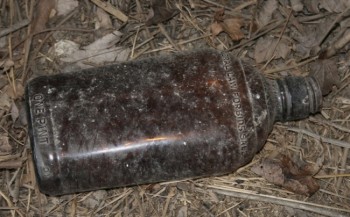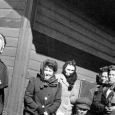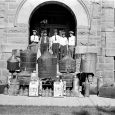The Gift of South Dakota
Subscriptions to South Dakota Magazine make great gifts!
Subscribe today — 1 year (6 issues) is just $29!
Oglala Sioux Tribe Vs. Alcoholism
Feb 20, 2012
Submitted for your approval: two haunting memories. One comes from a Sherman Alexie short story. Alexie, for any reader who does not know him, was born on the Spokane Reservation in Washington and writes incomparable stories about Native American life and especially life on the reservations. If you haven’t read his stories, you have much to look forward to. In the story I am thinking of, the main character buys a case of bottled beer. He drives away, opens a bottle and puts it to his lips. As soon as the beer hits his tongue he hurls the bottle out of the window. He does this with every bottle in the case.
The second memory comes from many years ago when I spent a summer working in a liquor store in Poinsett County, Arkansas. Craighead County, where I was born and grew up, was dry. Every evening a long line of cars made the trip from Jonesboro to the county line. You could tell a lot about the customer from his or her purchase. The guy who comes in every day or two and always makes the same purchase, say two bottles of Smirnoff Vodka or two bottles of White Port, was a high end or low end alcoholic. That was a blood level management strategy: one bottle for work and one for home. The guy who buys twenty half pint bottles of Jim Beam was (often quite literally) a bootlegger headed for ASU.
Such are the existential and economic tracks of that peculiar thirst. I thought of these things when I read the Argus Leader’s description of a recent lawsuit.
The Oglala Sioux Tribe is suing some of the world’s largest beer brewers, saying they knowingly have contributed to devastating alcohol-related problems on the Pine Ridge Indian Reservation.
The lawsuit, filed Thursday in U.S. District Court of Nebraska, seeks $500 million in damages for the costs the tribe has incurred in dealing with crime and providing social services and health care as a result of rampant alcoholism among the 20,000 tribal members.
It also targets four beer stores in Whiteclay, Neb., a tiny town near the reservation’s border that sold almost 5 million cans of beer in 2010 despite having only about a dozen residents.
Equally as important as the damage award the tribe wants is the fact that the lawsuit seeks a ruling of how much beer Whiteclay retailers can sell, White said. This is the key to stopping the trafficking of beer at Pine Ridge.
Trying control alcohol abuse by limiting the supply has always been a losing battle. It often seems to have perverse consequences. Alcohol consumption in dry counties is frequently higher than elsewhere. However, when the problem is this bad maybe it’s worth another try.
I am also skeptical of the idea that companies that sell a legal product in legal ways are responsible for the abuse of that product. However, asking the producers and distributors to bear some of the cost of alcohol abuse doesn’t seem like asking too much.
This lawsuit, whatever its outcome, won’t make a visible dent in the problem. I honestly do not have a clue what would do so. It is a truth that Americans do not easily acknowledge that some problems have no solutions. This does not excuse inattention. We ignore such problems at our moral peril. If the Oglala Sioux Tribe manages to remind us of what we choose to forget, that alone will be worth the billable hours that their lawyers put in.
Dr. Ken Blanchard is a professor of Political Science at Northern State University and writes for the Aberdeen American News and the blog South Dakota Politics.










Comments